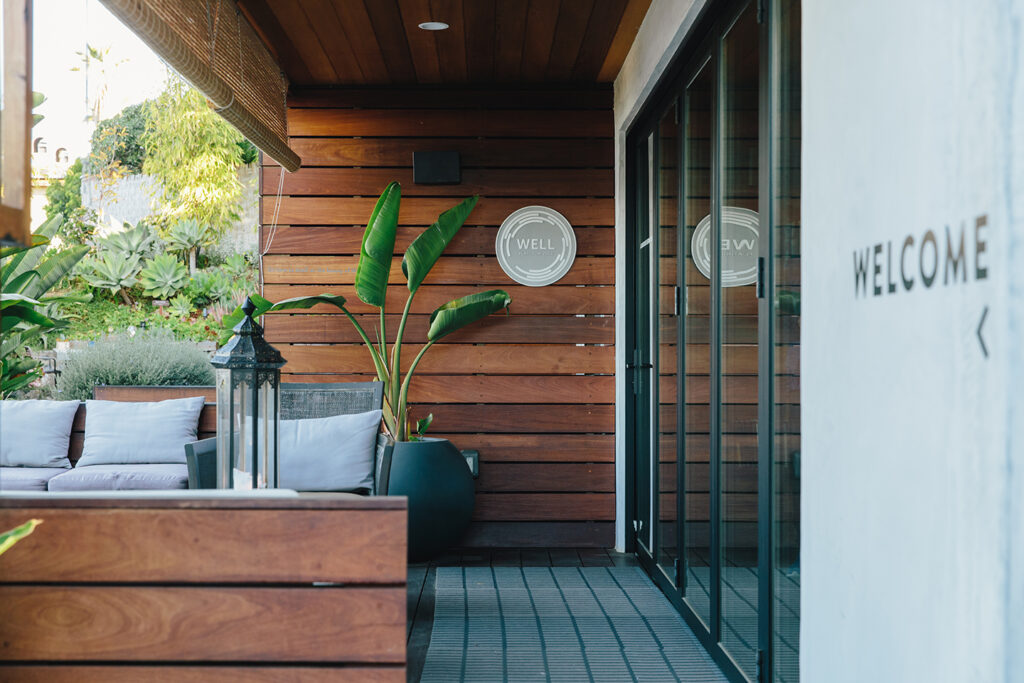
Top Green Boutique Hotels in California
Going beyond the choice for guests to reuse bath towels and bed linens, many California B&Bs and boutique hotels have made great strides to provide more sustainable lodging. From solar power and energy and water-saving devices to locally-sourced products and extensive recycling programs, these California inns go above and beyond in their commitment to environmentally sustainable practices.
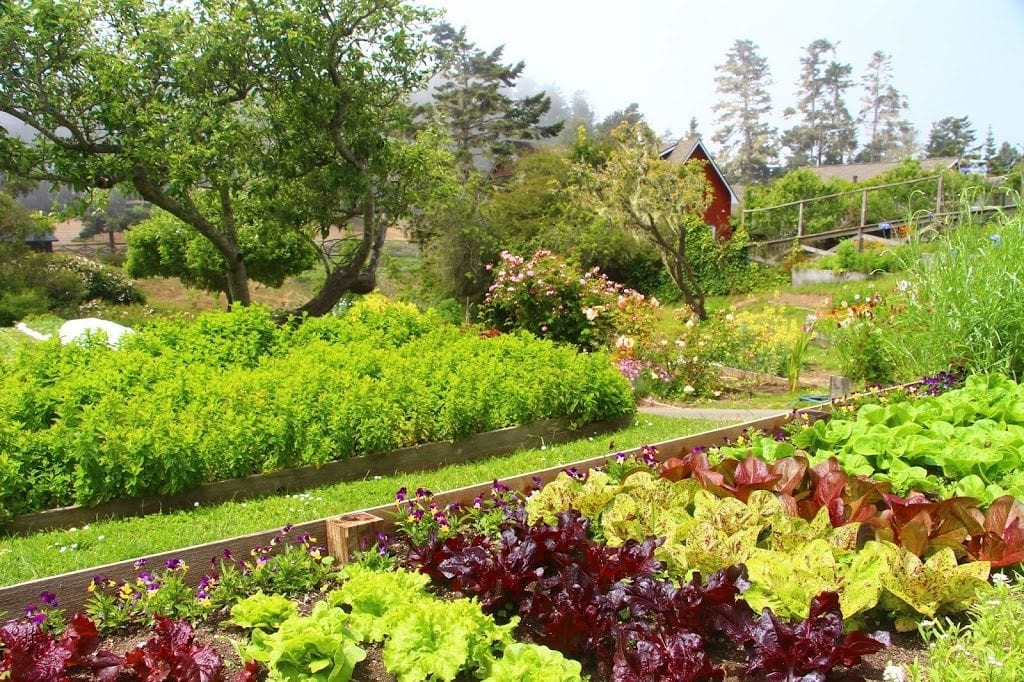
Stanford Inn by the Sea
An eco-resort on the Mendocino coast, the Stanford Inn has been pioneering sustainable practices in innkeeping for nearly 40 years. The inn’s own onsite certified organic farm produces much of the fruits, vegetables, and herbs featured in the restaurant’s acclaimed plant-based cuisine. All food wastes are composted and then dug back into the garden beds. In collaboration with Ecology Action and GROW BIOINTENSIVE®, the inn hosts training programs in sustainable small-scale farming. The inn also offers a Sustainable Mindset Field School for undergraduates and mini-programs for guests. Other sustainable efforts include converting the inn’s paper goods to bamboo and sugar cane fiber products and using to-go containers that are made from plant starch. The inn offers six electric vehicle charging stations and is adding four more this spring. For Earth Day, the inn is sponsoring a plant-based ultramarathon, which will take place on April 23, 2022.
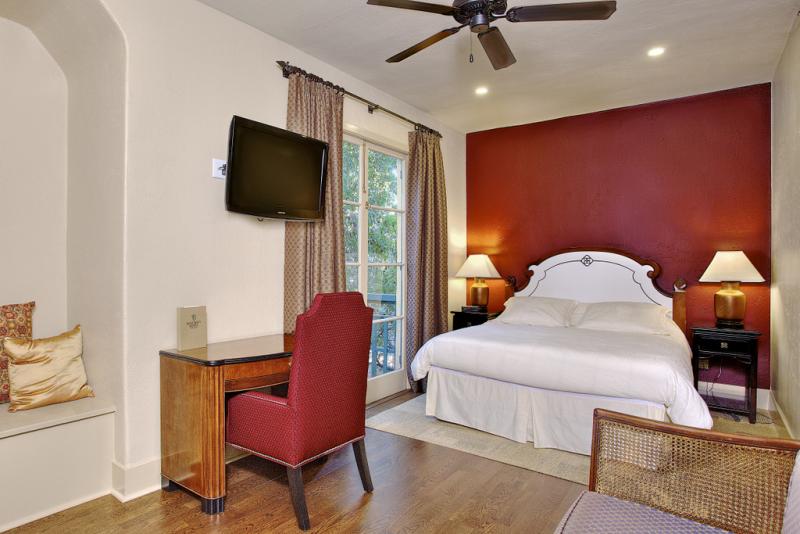
Bancroft Hotel
The historic Bancroft Hotel is the greenest hotel in Berkeley. Originally built in 1928 as the UC Berkeley’s College Women’s Club, the hotel underwent an extensive renovation under the guidance of David Gottfried, who is the founder of the U.S. and World Green Building Council, and Dan Smith, a notable Berkeley-based architect who has specialized in green building for over 30 years. The hotel’s long list of environmentally conscious choices was the result of thoughtful research into what systems power the hotel, how to furnish the rooms, and which products to use. Some of the green features include in-room desks and other furnishings made on-site from the hotel’s original armoires, FSC certified hardwood flooring, low-VOC paints, drapes made of recycled plastic soda bottles, hemp shower curtains and compostable shower curtain liners, a hydronic HVAC system, Smartlights certified lighting, recycling cooking oil into biodiesel, and more.
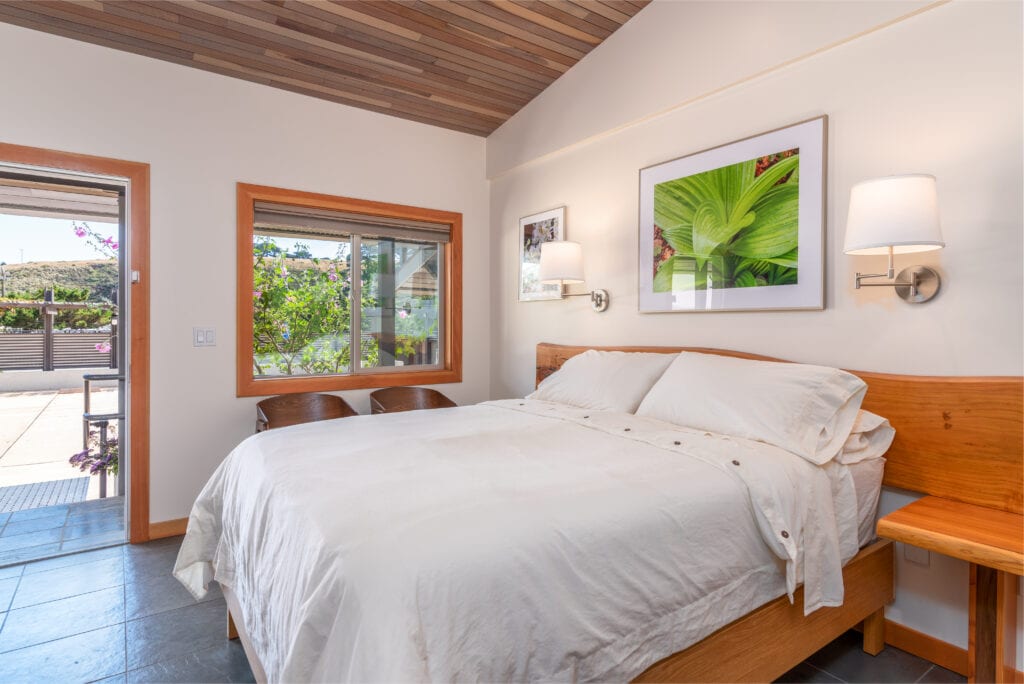
Wildflower Boutique Motel
At the Wildflower Boutique Motel in Point Arena, a formerly abandoned roadside motel was transformed into a modern, eco-friendly coastal getaway. In the renovation, owners Laura Cover and Jeff Hansen repurposed and reused as much of the old building as possible. The motel’s old redwood siding now graces the vaulted ceilings in each room. The rooms’ custom furniture was crafted from local wind-fallen cypress trees. The supremely comfortable beds feature organic Avocado Green Mattresses, which are handmade in California and dressed in organic cotton linens. Solar arrays line the rooftops and generate roughly 60 percent of the motel’s electricity, including powering the tankless water heaters for each room. The owners have also added new electric vehicle charging stations so that each parking spot at the motel now has its very own charging station.

Inn at Moonlight Beach
In Encinitas, the Inn at Moonlight Beach was the first lodging property in the world to achieve WELL™ Building Certification. Every detail of the property–from the biodynamic gardens to the lighting to the air- and water-filtration systems–was intentionally designed with wellness in mind. In tandem or as part of the WELL™ Building Certification requirements, the inn also incorporates a long list of green building design standards and ongoing practices. The inn was completely renovated using green, recycled, and locally sourced construction materials. The paints used are all low-VOC. The gardens feature drought-tolerant plants to conserve water and the inn replenishes the soil with on-site composting. A whole house water filtration system aids in minimizing plastic consumption. 90% of the inn’s electricity is derived from solar, and the inn offers two electric vehicle charging stations. Signage encourages guests to conserve both water and energy.
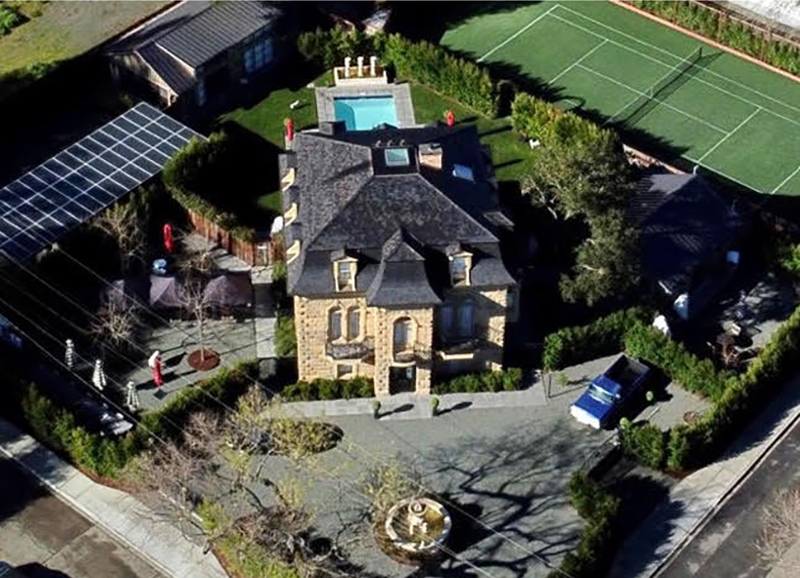
The Francis House
An exquisitely restored 1886 French Second Empire mansion, The Francis House brings old-world Parisian elegance to Calistoga with several green initiatives. Hidden behind a row of tall hedges at the back of the property, a parking area covered in solar panels provides up to 70% of the energy required to power the inn. A Tesla power wall stores solar energy, and guests have access to several electric-vehicle charging stations. The swimming pool is covered after 7:30 p.m. to conserve heat. Energy-saving appliances and regular audits of power consumption help to save on energy. A smart irrigation system minimizes unnecessary water use with timed watering. The tennis court is covered in artificial turf and 80% of the grounds are landscaped with gravel rather than grass to reduce water usage. Inside, the owners installed a hot, cold, and sparkling water filling station to encourage guests to use refillable bottles, and keyless entry systems cut down on lost keys and reduce paper usage.
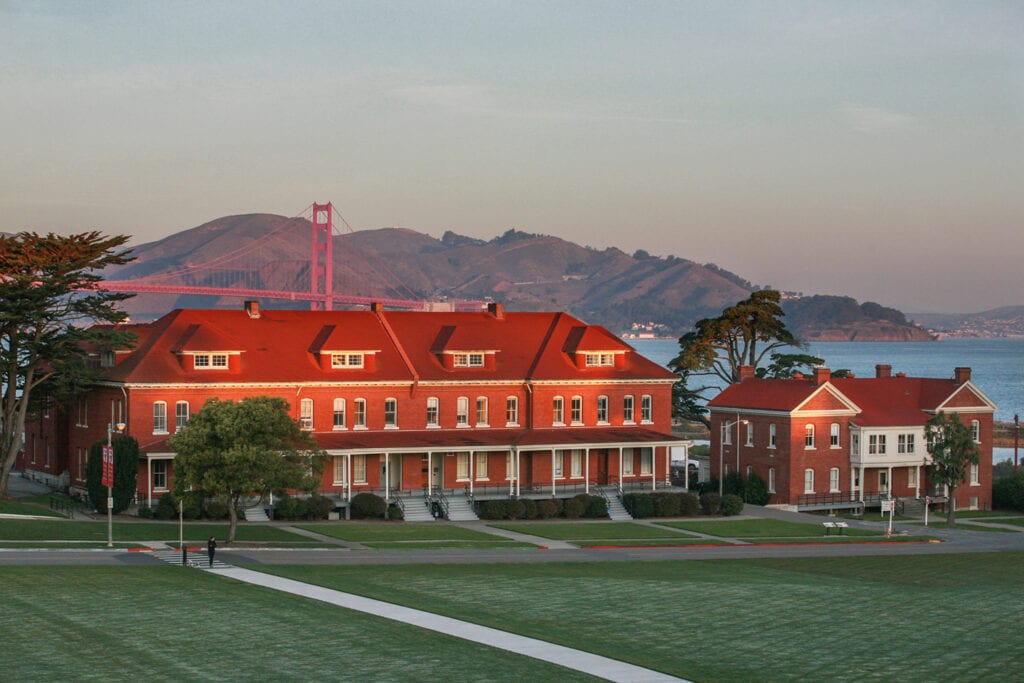
Lodge at the Presidio and Inn at the Presidio
Two sister hotels at The Presidio in San Francisco are LEED Gold certified for their adaptive reuse of historic buildings and ongoing environmentally responsible practices. Both the Lodge at the Presidio and the Inn at the Presidio were rehabilitated from former U.S. Army buildings. Throughout the construction process, they utilized recycled and post-consumer recycled content, most notably reusing blue jean scraps for insulation. The Lodge exclusively selected non-toxic and low-emitting materials for paints, flooring, adhesives, fabrics, carpets, and composite wood materials. At the Inn, existing features such as hardwood floors, original doors, and light fixtures were reused whenever possible. Extensive energy and water-saving systems were put in place to ensure the day-to-day demands of the hotels conserved as much energy and water as possible. Other ongoing practices include green cleaning solutions, hyper-local sourcing of products, and a rigorous waste management program where the majority of waste is recycled or composted and diverted from landfills.
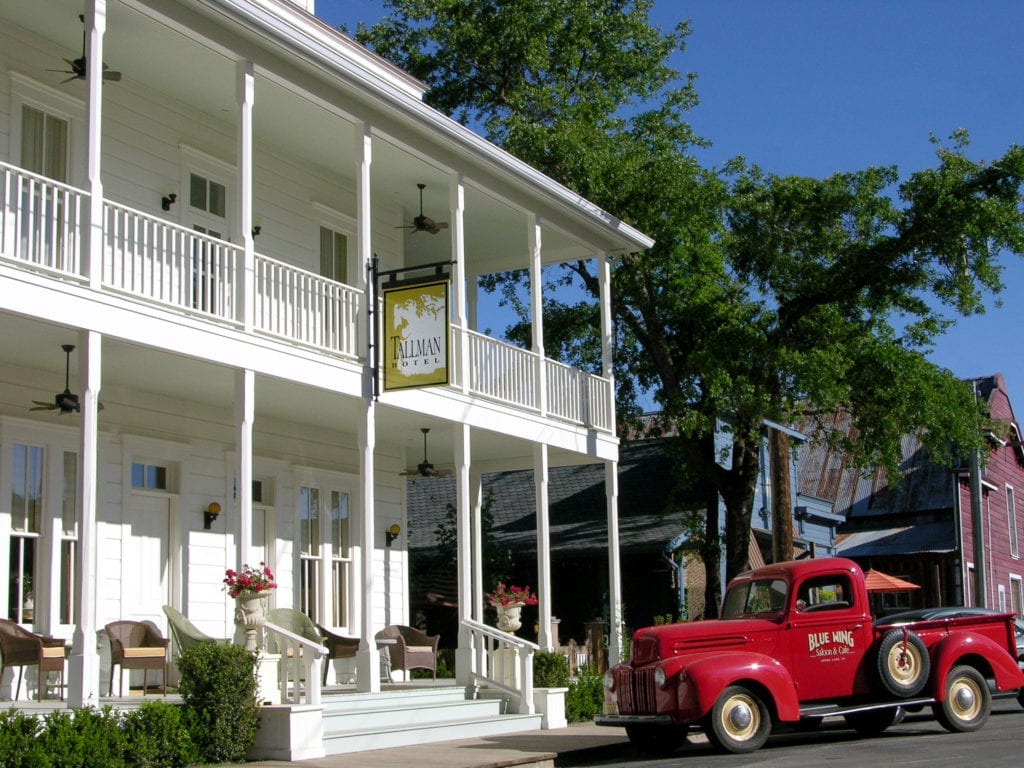
Tallman Hotel
In Upper Lake, the elegant Tallman Hotel was painstakingly restored to evoke the period details guests would have experienced when they first arrived by stagecoach in the 1890s. But the hotel’s historic façade belies its state-of-the-art geothermal and solar energy systems. Buried 300 feet below ground, 43 wells and a closed-loop system of pipes comprise the quiet and highly efficient GeoExchange system that heats and cools the property. As a byproduct, the system also generates hot water for the guest rooms, the restaurant, and Ofuro soaking tubs. Hidden from sight on the south-facing roof of the restaurant, solar panels generate electricity to complement and augment the GeoExchange system during peak usage times. Over a century ago, the livery stable next door was a key feature for guests, but today, the hotel offers two types of electric vehicle charging stations for a new generation of travelers.
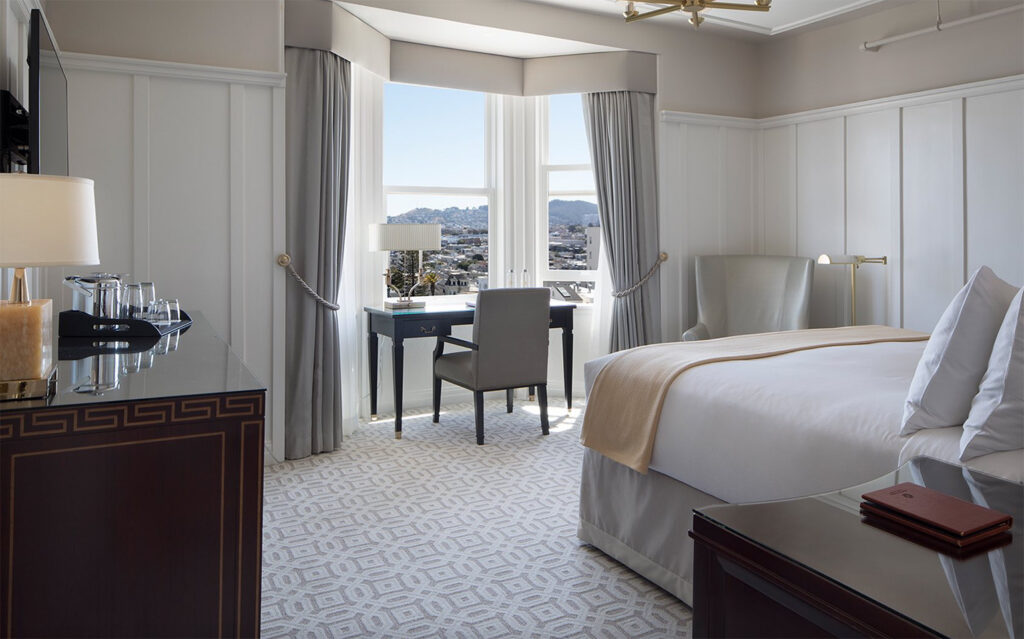
Hotel Drisco
At the top of San Francisco’s prestigious Pacific Heights neighborhood, the Hotel Drisco is a luxurious turn-of-the-century hotel that is dedicated to environmental sustainability. The hotel’s on-site laundry facilities use a cold-water, unscented, chemical-free ozone cleaning system. Housekeepers utilize the same ozone cleaning system in conjunction with certified green cleaning products to service the rooms. A radiant hydronic heating and cooling system saves on energy and allows the temperature of each room to be individually controlled with heated or chilled water running through hidden pipes in the ceiling. All showers and faucets use water-saving aerators, and a hot water conservation system adjusts the amount of hot water stored based on past patterns of demand. Light bulbs and fixtures are continually upgraded to utilize the most advanced energy-saving technologies and vacancy sensors turn lights off when no one is present. The hotel reduces plastic consumption by offering reusable glass bottles with filtered water pitchers in each room. Other practices include donating partially used bath amenities and leftover food to minimize waste.